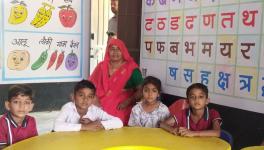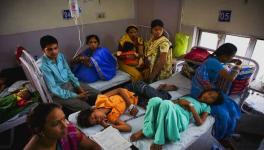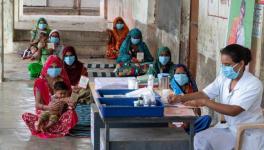Will AYUSH Doctors Be Permitted to Perform Abortions At PHCs?
Image for representational use only.Image Courtesy : The Better India
One of the first decisions the Modi government has taken in this second term is to give a major push to the AYUSH streams of medicine. AYUSH Minister Shripad Naik has announced that every primary health centre (PHC) would now have a doctor from an alternative medicine stream to treat patients, apart from a regular allopathic doctor. The AYUSH doctors are from the Ayurveda, Homeopathy, Unani and Siddha traditions of medicine.
Naik has also announced ambitious plans to set up 1.12 lakh AYUSH clinics and 150 AYUSH hospitals. However, the kinds of medicine the AYUSH doctors will have the freedom to practice is still an open issue.
The million-dollar question is whether they will be allowed to do surgeries. Specifically, will they be permitted to perform abortions on pregnant women who visit these PHCs? A large number of doctors believe it is only a matter of time before they receive permission to do so.
The demand for abortions is huge and there are simply not enough gynaecologists in the country who can meet it. There had been pressure on the previous Minister of Health and Family Welfare, JP Nadda, to get amendments to the existing Medical Termination of Pregnancy Act (MTPA), 1971 passed by Parliament. A draft Bill had proposed several changes in the MTPA. A significant amendment proposed that the abortion limit be extended from 20 to 24 weeks, since with medical advancements it has become safe to terminate pregnancies at that stage.
Another clause in the Bill allowed for training to be provided to AYUSH doctors, auxiliary nurse midwives (ANMs) and nurses to enable them to conduct abortions.
This clause became extremely contentious as India’s existing pool of 90,000 MBBS doctors and 40,000 gynaecologists had opposed it tooth and nail.
Dr KK Aggarwal, former president of the Indian Medical Association, feels the main problem with this proposal has been that though surgeries will be performed by the AYUSH team, the responsibility for any mishap would rest on the shoulders of the Chief Medical Officer who belongs to the allopathic stream of medicine.
“Medical abortion requires surgery. However, though surgeries are being performed in both Ayurveda and Homeopathy schools of medicine, ultimately every PHC comes under the national health programme. In case of a mishap, the responsibility for any kind of abortion-related problems will fall on the CMO (chief medical officer) at the district level,” says Dr Aggarwal.
Dr Pratima Mittal, who is heading the gynaecology department at Safdarjung Hospital, is appalled at this suggestion.
“Can any Tom, Dick and Harry be allowed to conduct surgeries?” Dr Mittal asks and then clamps up, insisting that as a government employee she is not allowed to speak to the press.
Dr Kanta Nayar, a gynaecologist who practises at the Surjeet Wasu Charitable Clinic in Sainik Farms, also advocates caution.
“Abortion is a very dangerous procedure and can be performed only by a doctor who has knowledge and training in the areas of anatomy, physiology and surgery,” explains Dr Nayar.
“Even the insertion of an IUD by an untrained health personnel can end up damaging the uterus.”
Another well-known gynaecologist Dr Puneet Bedi voices caution and concern.
“Abortion can be a life-threatening surgery and requires tremendous expertise,” said Dr Bedi.
AYUSH doctors are upset at the campaign against them. Leading Dehradun-based Ayurveda doctor Dr Kaushal rubbished the criticisms that they are not trained for such work.
“Our five-and-a-half year degree to get a Bachelor of Ayurvedic medicine and Surgery as well as the five-and-a half year degree to get a Bachelor in Homeopathy and Surgery is equivalent to an MBBS degree. It is not any the less,” said Dr Kaushal.
“Also, I would like to point out that ayurvedic doctors are conducting surgeries in several centres, including BHU in Varanasi, Tibbia College in Delhi, MD University in Rohtak and Rishikul Ayurvedic College in Haridwar. Just because these facts are not in the public domain does not mean they are not happening,” he said.
Dr Lalit Chaudhry, an ayurvedic surgeon who has specialised in renal surgery, believes ayurvedic doctors must meet two criteria before they are allowed to undertake abortions.
“Only doctors who have a post-graduate degree in ayurvedic surgery should be allowed to handle abortions. Secondly, we must be in a position to handle emergencies and for that we need the necessary equipment and support, which is not there at present,” said Dr Chaudhry.
Prof Vidula Gujjarwar, director of the prestigious Chaudhury Prakash Ayurveda Institute and a trained pathologist, points out that surgeries in Ayurveda have been listed out in their classic 5,000-year-old text called Sushrut Samhita.
“We perform surgeries in anorectal problems and Sushrut Samhita has also listed out how cataract surgery can be performed. But organ transplant and surgery of the thorax, to cite two examples, are not there in our form of medicine. But with proper training, our doctors can perform abortions. If this happens, they must also be given legal protection,” said Gujjarwar.
“In Maharashtra, I know of Ayurveda doctors who are doing deliveries, abortions and Caesarean cases. But this varies from state to state.”
Sabu George, who has fought against sex determination for the last three decades, believes the time has come, like the rest of the world, to allow trained AYUSH doctors and nurses to do abortions. “This is one important way that the shortfall of doctors will be met. The government wanted to introduce this scheme four years ago, but the allopathic doctors went directly to the PMO and the scheme was shot down,” said George.
This debate apart, there are major shortcomings in the MTPA itself. Technology seems to have overtaken it, making it almost obsolete. There is medication available in the market which enables women to self-abort up to a period of eight weeks.
Another problem with the MTPA is that it imposes a limit of 20 weeks for abortion but many foetal abnormalities can only be detected after 20 weeks. In such cases, a woman needs to get a court’s approval for an abortion but since this can take a long time coming, chances are some of the women in this situation are forced to carry the pregnancy through and deliver.
The other option — which millions of women resort to — is to go for an illegal abortion, often undertaken by ill-trained quacks.
The findings of a study by the Guttmacher Institute published in The Lancet suggest that 15.6 million abortions were carried out in 2015 in India and only 3.4 per cent of these took place in health facilities.
The extensive Abortion Assessment Project, spanning two years between 2000 to 2004, had shown that 56 per cent abortions were unsafe. Out of 6.4 million annual abortions, 3.6 million were unsafe. These unsafe abortions accounted for 13 per cent of maternal deaths in the country.
This works out to between 13-15 women dying every day — making unsafe abortions the third leading cause of maternal deaths.
“These deaths are hugely preventable. If they had happened in safe facilities, they would not have happened. It is primarily for this reason that the WHO had prepared guidelines by which AYUSH doctors and nurses could be provided training to help in task sharing of abortions,” said Vinoj Manning, CEO of Ipas Development Foundation, an NGO in the field of reproductive rights.
There are other issues with the law that need to be addressed. Even married women have no freedom to opt for an abortion, Manning pointed out. “A married woman can undergo an abortion only if she can show that pregnancy occurred because of contraceptive failure. But women feel that they should be able to access this facility whether they be married or not,” said Manning.
“Indian society has changed drastically over the past few decades. Single women are more sexually active while others have opted to go in for live-in relationships.”
It is for this reason that several groups are demanding that the right to abortion be included in a portfolio of pregnancy rights. Dr Manisha Gupta, co-founder of Mahila Sarvangeen Utkarsh Mandal, believes the time has come for a major change of attitude among the medical fraternity. “The doctors’ lobby has to be broken. Our nurses and ANMs are dedicated and can learn the necessary skills. Instead of this exclusionist approach, we need to adopt an inclusionist policy to reach out to women in our villages and semi-urban populations,” she said.
The right to a safe and legal abortion is every woman’s right. All eyes are on the Minister of Health, Dr Harsh Vardhan. Let us see whether he is willing to uphold this right and take the necessary steps to ensure it.
Get the latest reports & analysis with people's perspective on Protests, movements & deep analytical videos, discussions of the current affairs in your Telegram app. Subscribe to NewsClick's Telegram channel & get Real-Time updates on stories, as they get published on our website.
























